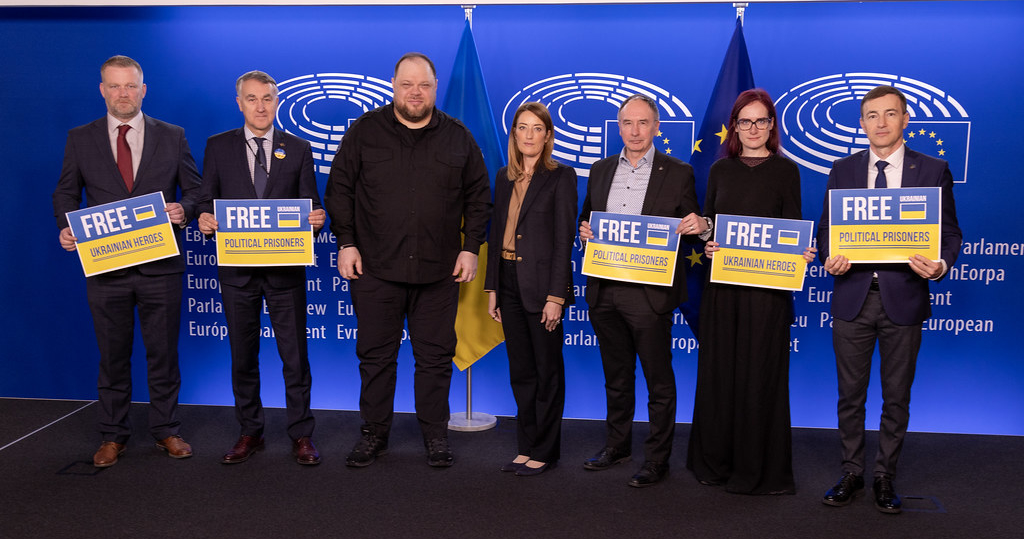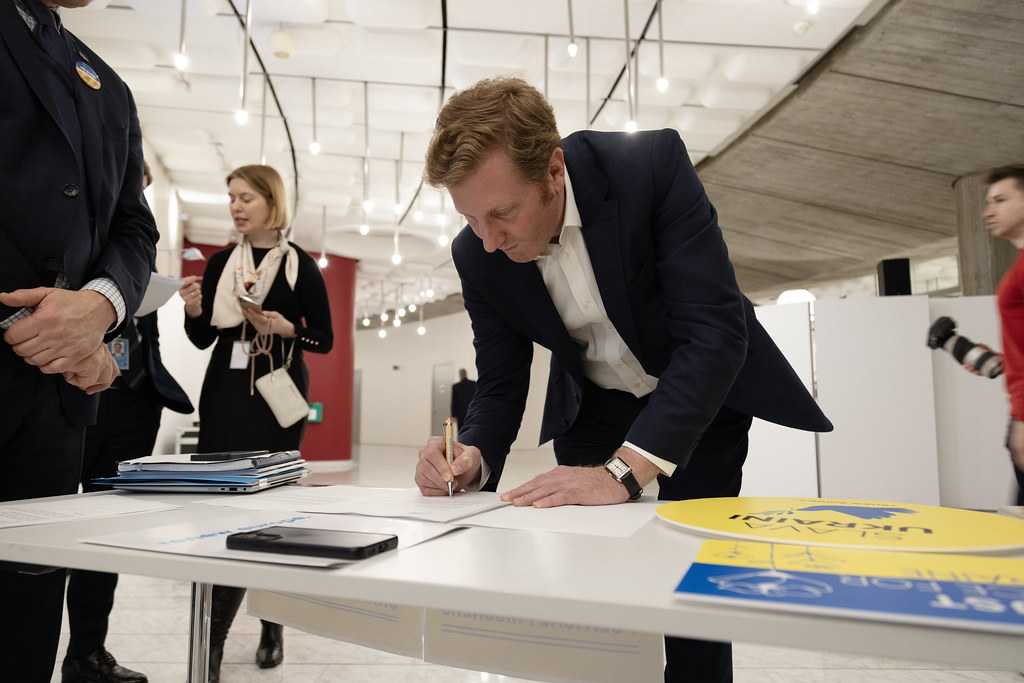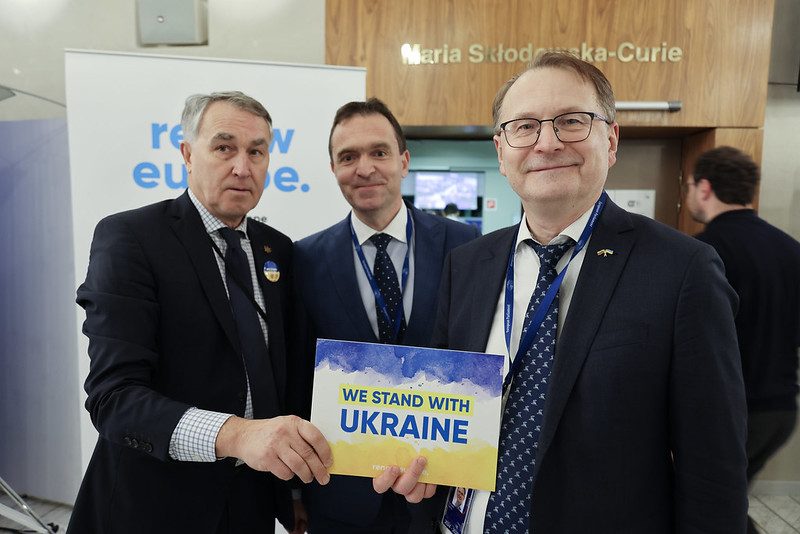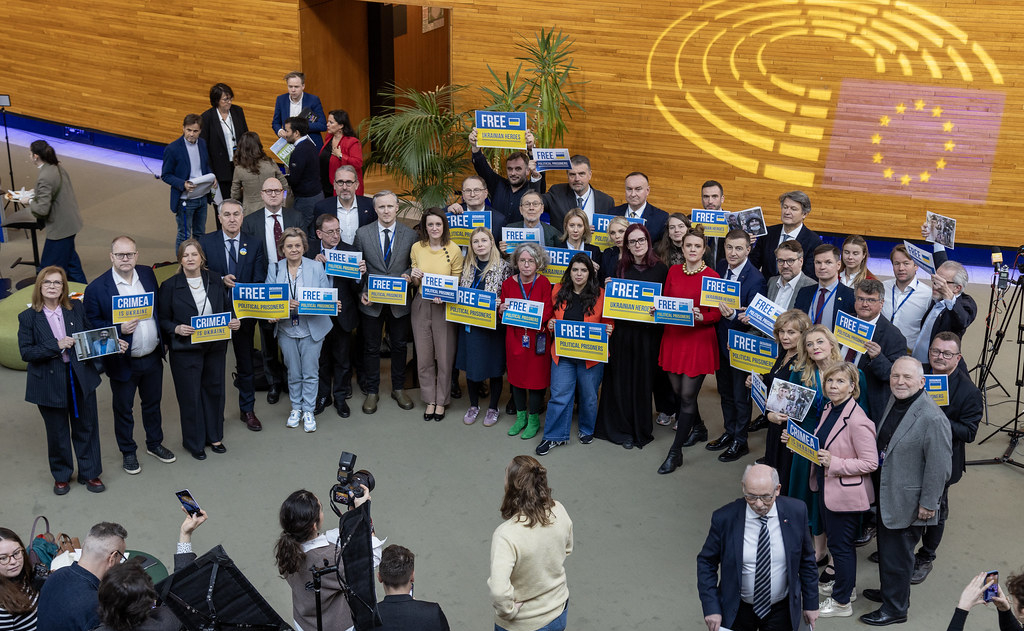Members of the European Parliament showed solidarity by writing 150 letters to Ukrainian political prisoners
The European Parliament held a “Letters to Free Crimea” campaign to mark the 11th anniversary of the occupation of Crimea by Russia and the third anniversary of Russia’s full-scale invasion. With the guidance of MEP Markéta Gregorová (Greens/EFA, Czechia), MEP Petras Auštrevičius (Renew Europe, Lithuania), MEP Andrey Kovatchev (EPP, Bulgaria), MEP Thijs Reuten (S&D, Netherlands), and MEP Reinis Pozņaks (ECR, Latvia), members of the main political groups joined efforts to address 150 Ukrainian political prisoners.
 Photo: “Letters to Free Crimea” campaign during the plenary session of the European Parliament in Strasbourg by Andrius Dogelis
Photo: “Letters to Free Crimea” campaign during the plenary session of the European Parliament in Strasbourg by Andrius DogelisThe signing of the letters place during the February plenary session of the European Parliament in Strasbourg. It coincided with the visit of Ruslan Stefanchuk, the Speaker of the Verkhovna Rada of Ukraine, who met the abovementioned Members of the European Parliament (MEPs) and was presented with the initiative.
During the “Letters to Free Crimea” campaign, the MEPs wrote 150 letters to political prisoners who are originally from Crimea or are held behind bars in the territory of the occupied peninsula. Currently, there are at least 218 political prisoners, including 132 Crimean Tatars. Occupiers persecute Ukrainian citizens on religious grounds, for their work in journalism and human rights, as well as for anti-war statements. To justify repressions, they fabricate cases related to sabotage, terrorism, extremism, and espionage.
“Even a letter can save a life. At first glance, this is a symbolic act. In fact, letters have a real impact. Prisoners who receive them are treated better because Russian guards know the world is watching. We must not forget those who pay for freedom with their lives,” emphasized the importance of the campaign MEP Markéta Gregorová (Greens/EFA, Czechia).
 Photo: MEP Markéta Gregorová (Greens/EFA, Czechia) by Kateřina Loskotová
Photo: MEP Markéta Gregorová (Greens/EFA, Czechia) by Kateřina LoskotováShe reminded a story of the Crimean resident and political prisoner Halyna Dovhopola who turns 70-year-old this year: “She publicly expressed her condemnation of the occupation of Crimea and maintained contact with Ukrainian volunteers, for what the Russian regime imprisoned her for 12 years. She has serious health problems now, and the occupiers do not allow her to be treated. In these terrible conditions, 12 years of imprisonment may become a death sentence for her.”
Colonies in Russia and the temporarily occupied territories of Ukraine are filled with elderly and disabled people, who were unjustifiably detained, some sentenced to years in prison, and some held incommunicado. For instance, Iryna Danylovych was sentenced to 6,11 years and her health was ruined behind bars for her civic journalism activities. A 77-year-old Spanish citizen Mariano Garcia Calatayud has been held in detention incommunicado for almost 3 years and severely tortured for providing humanitarian aid in the occupied Kherson region and speaking against occupation. The youngest Crimean political prisoner Appaz Kurtamet, born in 2003, was sentenced to 7 years for lending 11 EUR to his acquaintance who served in the volunteer battalion.
 Photo: Writing letters to Ukrainian political prisoners held in Russian detention by Andrius Dogelis
Photo: Writing letters to Ukrainian political prisoners held in Russian detention by Andrius DogelisPolitical prisoners are tortured, denied medical care, and taken to penitentiary institutions thousands of kilometers away from their homes to sever ties with loved ones and lawyers, isolate and break them. This is why, keeping in touch with them through letters is truly crucial. The power of writing letters to places of detention was confirmed by the released Nariman Dzhelyal and Leniie Umerova. In particular, Leniie said: “I am here, among you, because at one time, society was not silent. People wrote letters, spread the word, and mentioned my name in the international arena. And it worked.”
“Hundreds of Crimeans are imprisoned for not recognising the Russian yoke. Thousands of Ukrainian defenders face torture and inhuman conditions in Russian gulags every day. I would like to thank these courageous people for their loyalty in the struggle for the freedom of the Ukrainian nation and state, and I send them a sincere message of personal solidarity with the repressions they are experiencing,” stated MEP Petras Auštrevičius (Renew Europe, Lithuania).
 Photo: MEP Petras Auštrevičius (Renew Europe, Lithuania), MEP Ľudovít Ódor (Renew Europe, Slovakia), MEP Dainius Žalimas (Renew Europe, Lithuania) by Andrius Dogelis
Photo: MEP Petras Auštrevičius (Renew Europe, Lithuania), MEP Ľudovít Ódor (Renew Europe, Slovakia), MEP Dainius Žalimas (Renew Europe, Lithuania) by Andrius DogelisMEP Andrey Kovatchev (EPP, Bulgaria) added: “I am sure these letters will serve as a beacon of hope to the prisoners, a reminder that the Members of the European Parliament support them and will continue to stand by Ukraine for as long as it takes. Hopeful for an end to the horrors of war on the European continent, Ukraine must be at the table when decisions are being made for its future, as must also be the European Union, working towards a just and lasting peace.“
“The people of Ukraine have become a symbol of resilience, courage, and an unbreakable spirit for the entire world. Three years into Russia’s full-scale invasion, Ukrainians have proven that the desire for freedom is stronger than any machinery of oppression. The Russian regime may try to imprison and isolate them, but it cannot break their spirit – and we are here to make sure of that,” said one of the initiators of the writing letters campaign Reinis Pozņaks (ECR, Latvia).
Finally, MEP Thijs Reuten (S&D, Netherlands) highlighted: “With this action we want to send a clear European message. Europe did not forget about Crimea, Russia’s annexation and the fate of those who are being held in captivity on purely political grounds. I hope our letters will give them some strength to cope with their dreadful conditions and let their captors know we are still watching.”
 Photo: “Letters to Free Crimea” campaign during the plenary session of the European Parliament in Strasbourg by Andrius Dogelis
Photo: “Letters to Free Crimea” campaign during the plenary session of the European Parliament in Strasbourg by Andrius DogelisShow your solidarity too and join the “Letters to Free Crimea” initiative too. Choose a Crimean political prisoner from the list, write a letter according to instructions and send him or her a letter directly to the place of detention, to a physical address in Ukraine for further distribution (Kyiv, 01001, P.O. Box B-539, Human Rights Information Center) or to an e-mail (Free.CrimeaUA@gmail.com).
The campaign is advocated for by ZMINA, Crimean Process, Crimea SOS, Mission of the President of Ukraine in the Autonomous Republic of Crimea and PEN Ukraine.
As a reminder, the European Parliament adopted the “Resolution on the 11th year of the occupation of the Autonomous Republic of Crimea and the city of Sevastopol by the Russian Federation” in December 2024. It called for the immediate release of illegally convicted Crimean residents, including Iryna Danylovych, Tofik Abdulhaziiev and Amet Suleymanov, and mentioned that Crimeans continue to suffer serious human rights violations. 446 MEPs called on the international community not to recognise the seizure of Crimea and to support efforts to de-occupy the peninsula.
If you have found a spelling error, please, notify us by selecting that text and pressing Ctrl+Enter.















